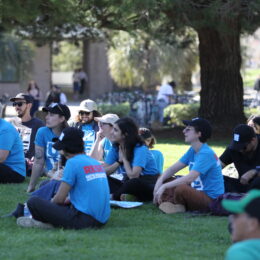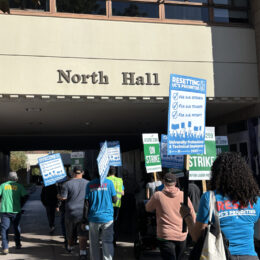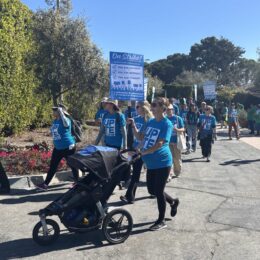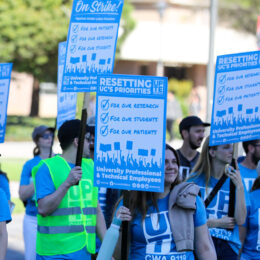Chants calling out for better wages and benefits for University of California employees echoed throughout campus on Wednesday and Thursday, as campus service workers, health clinicians, researchers and technicians converged in a swarm of green and blue for a worker strike.

Nina Timofeyeva/Daily Nexus
University Professional and Technical Employees Communications Workers of America (UPTE-CWA) Local 9119 represents nearly 20,000 employees in various research labs and medical facilities across the UC system. Workers include nurse care managers, mental health counselors, optometrists, pharmacists, physical therapists, clinical researchers, IT analysts and animal health technicians.
UPTE-CWA 9119 has been bargaining with University administration for new contracts since last June, asking for higher compensation and staffing levels. They called for a strike vote two weeks ago because the University allegedly failed to bargain in good faith — with intent to reach an agreement — and unlawfully imposed restrictions on where workers can picket.
“They are basically doing unfair labor practices by not really responding to them [contract proposals], not even coming halfway or telling us what they want different. So that’s why we’re doing an unfair labor practice strike,” Sam Feinstein, a lab manager under the UCSB Department of Mechanical Engineering and a member of the campus bargaining team, said.
The UC has proposed wage increases of 5% starting in July and 3% in 2026 and 2027. This falls short of the union’s proposed wage increases of 9% in 2025 and 8% in 2026 and 2027. The union argues these pay increases do not keep up with ballooning expenses due to inflation.
The University said in a statement last week that they have offered robust wages and benefits, and accused the union of leaving the bargaining table prematurely.
“The University of California is disappointed that [American Federation of State, County and Municipal Employees Local 3299] AFSCME and UPTE plan to strike. Both unions have chosen to focus their energy on strike preparation and amplifying misinformation rather than negotiating in good faith. We have offered each union meaningful, wage increases, health care premium reductions, and other offers to directly address the issues they’ve indicated are important to their members,” the UC Office of the President said in their Feb. 21 statement.
They said UPTE began strike preparations the same month contract negotiations began, failed to attend the most recent bargaining session and declared an impasse before responding to the UC’s offers.
At UCSB, UPTE workers say they are paid less than their counterparts at UC Los Angeles, Riverside, Berkeley and San Diego. Workers said the University argued that Santa Barbara is a rural community and is therefore cheaper to live in.
- Nina Timofeyeva/Daily Nexus
- Lizzy Rager/Daily Nexus
- Lizzy Rager/Daily Nexus
- Nina Timofeyeva/Daily Nexus
- Lizzy Rager/Daily Nexus
- Nina Timofeyeva/Daily Nexus
“UCSB is considered a rural university, so our wages are not on par with other UCs that have the same cost of living,” Anna Krasno, the clinical director of the Koegel Autism Center, said. “So I have a second job. I have a private practice because I can’t live in Santa Barbara on my UC salary.”
UPTE began their three-day strike on Wednesday, alongside service workers from AFSCME 3299, who have also protested bad faith bargaining by the University in protests and a strike in October last year. UCSB’s strike went for two days, from Feb. 26-27.
The union began their rally at Storke Tower at 9 a.m., joining the AFSCME protestors passing by. Down the arbor walk, the group of over 100 workers chanted and walked in circles outside the library steps. From 10 a.m. to 1 p.m., the group embarked through North Hall, to the Visitor Center, to De La Guerra Dining Commons and back to the Storke Tower. No Student Safety Partners or officers from UC Police Department were present.
Their chants included “Si se puedes,” “UC, UC, you’re no good, treat your workers like you should,” “We won’t stop until we win this contract” and “United not divided,” among others.
On the second day of the strike, UPTE protestors marched across campus from morning to 4 p.m., starting at Storke Tower, rallying outside the UCSB Counseling & Psychological Services (C.A.P.S.) building and the library, and ending back at Storke Tower. Student band Veranda Nights also performed for the joint strike at Storke Tower on Feb. 27.
“I see people that are the most distressed,” clinical psychologist Steffanie Tinsley said in a speech to union workers at Storke Tower on Feb. 27. “It’s difficult. We deserve to be compensated.”
Feinstein said the UC is conducting unfair labor practices by not responding to their contract proposals. In their negotiations, the UC tried to increase the workers’ healthcare premiums and costs, which Feinstein said is illegal.
“We’ve asked them for information on staffing because there’s critically low staffing rates here,” Feinstein said. “They’re required by law to give us that information so we can actually have firm numbers, but they haven’t done that yet.”
Many union members are concerned that their wages cannot accommodate the cost of living in Santa Barbara.
“I live an hour away from campus,” Andrew Fugman, a principal electronics technician at UCSB, said. “It’s 10 hours a week of just driving.”
According to the Economic Research Institute, the cost of living in Santa Barbara is 26% higher than other cities in California. The county had the second-highest poverty rate in California, according to the California Poverty Measure. Compared to other UC campuses, UCSB workers say they are paid less than their counterparts.
“I know that UC Berkeley, UCLA and UC San Diego all make a higher rate to do the same work, somewhere around 25 to 30%,” UCSB principal electronics technician Ross Derer said.
Brandi McCallister, a social worker for Student Health Service, said her department has faced issues with filling vacancies due to issues of turnover caused by the cost of living in Santa Barbara.
“I’ve never seen turnover like we are experiencing now,” McCallister said. “It is really hard to attract people because the pay is just not adequate for the cost of living here in Santa Barbara.”
McCallister said that low staffing has caused concern for maintaining appointments within her department, as well as impacting student needs. There are currently nine positions open in the C.A.P.S. office, which has caused two-month wait periods for counseling appointments, she said.
“I’m concerned not only for myself, but for students,” McCallister said. “Students deserve these services.”
Student health is also impacted by staffing levels. Michael Benaron, a campus union representative and physician assistant at UCSB Student Health, said he has repeatedly had to turn down students due to understaffing.
“We all want to be in the center, taking care of patients, taking care of students, back in our research stations and we want to be doing that work. We don’t want to be out here,” Benaron said. “We just deserve the dignity of getting paid fairly well for the work that we do. The UC, it’s a world-class institution, and they should be paying world-class wages when we fight.”
Throughout the entire UC, there has been a 50% turnover of healthcare workers in the past few years, he said. That means fewer students are seen every day at Student Health.
Many of the workers recount being overworked due to issues with staff retention. Derer, who has worked for the campus since 2010, said he comes in on-call as many as three to five times in one night and has to come back for morning shifts.
“They’re not going to have anybody fix their emergency equipment [today]. There will be nobody here to respond to any fire alarm emergency or any other emergency equipment on campus,” Derer said.
In some cases, staffing problems have caused the UC to hire unqualified workers to fill the vacancies.
For electronic technicians, who install and maintain fire emergency systems on campus, the University has begun to hire and train people who aren’t licensed to do the work, Fugman said. He added that unlicensed and licensed workers get the same pay.
“They are looking for anyone and expecting us to train them from the ground up,” Fugman said.

Nina Timofeyeva/Daily Nexus
Across the ten UC campuses, UPTE workers participated in three-day strikes. According to UPTE’s Instagram, union members at UCSB were invited to strike at the UCLA campus on the third day since UPTE did not organize on campus on Feb. 28.
This is an ongoing story. The Nexus will continue to report on this topic as more information becomes available.





















I appreciate how these employees are banding together to secure fair treatment and improved conditions. Large institutions have a responsibility to address staff concerns and create supportive work environments. The situation reminds me of how boots customer service quickly addresses customer needs, reflecting a commitment to genuine care. Strikes bring attention to important workplace issues, and it’s encouraging to see these workers stand up for what they believe in.
UC Health clinicians, researchers, and technicians work collaboratively to push the boundaries of medical innovation, patient care, and scientific discovery. Their interdisciplinary approach ensures comprehensive treatment and groundbreaking research. Whether advancing surgical techniques or exploring vision correction methods like https://www.clearvision1.com/myopia-ortho-k-daly-city, their commitment to improving health outcomes remains unmatched across all specialties.